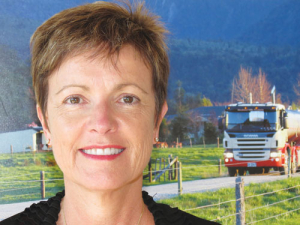DairyNZ opens applications for associate director role
DairyNZ is giving New Zealand farmers a unique opportunity to gain hands-on governance and leadership experience within the dairy sector.
 Westland Milk’s new chief executive Toni Brendish says shareholders are gutted at the co-op’s performance.
Westland Milk’s new chief executive Toni Brendish says shareholders are gutted at the co-op’s performance.
Westland Milk Products’ (WMP) new chief executive says shareholders in the cooperative feel completely gutted at the performance of the co-op and they have every right to feel that way.
In an exclusive interview with Dairy News, Toni Brendish says Westland is disappointed it has not performed and that this has to be fixed.
For several months it’s been widely known that Westland is in financial trouble and six months ago Brendish was hired to get the cooperative back on its feet. Now she is reviewing the company and has already hinted that major changes are afoot, including staff redundancies that will reduce overall staff numbers.
But she has told shareholders there is no silver bullet fix for the situation, “no light switch somebody needs to flick on so that we magically close the gap between ourselves and the other cooperatives; we have to go back and get it fixed right. For shareholders there will be pain this year.
“We have been transparent that we won’t be matching the Fonterra price by closing the gap but everything we are doing is making sure we hit the new season well. I know that’s not palatable for our shareholders and we need to work with them one-on-one and see what can we do.”
Brendish says DairyNZ has published the fact that the breakeven price for dairy is now $5.30. Canterbury suppliers will probably get less than that, and some dairy farmers on the West Coast will struggle and some may need help to get to that break-even number.
Brendish is an Australian who has worked in the fast moving consumer goods area for most of her career; most recently she worked for the French multinational Danone.
“When I started working for Danone, getting into infant formula, I understood nutrition and the impact you can have on people lives. That is the attraction.
“When I was first approached about this role the initial attraction was dairy, and the second attraction was the whole integration of the product from farm to plate -- working with farmers and suppliers all the way through to delivering the product to consumers, and that was for me the attraction.”
During the interview process Brendish was made aware of the problems facing the co-op. The WMP board was upfront with her about the state of the company and wanted someone to ‘transform’ it, she says.
“I didn’t come in with rose tinted glasses. The board told me they had made investments and these hadn’t been executed as well as they should have been. But there are always surprises and I think the level of transformation required is probably the surprise.
“It’s a bigger job in respect of the operational efficiencies we have to get. Westland had a bad year last year, but when I look back it was probably coming for a couple of years earlier in terms of operational challenges that haven’t been addressed.
“We have been making good investment of strategic assets, but as far as the rest of the business is concerned we haven’t kept our pencil as sharp as we needed to for efficiency.”
China strategy thin
According to Toni Brendish, WMP has made good decisions about where it wants to be, but hasn’t always put in the people capability to support that.
For example, the co-op put just one person into the huge China market, expecting them to build it up from scratch.
“It’s going to take time to do that. Many other organisations would say ‘ok if we going to make this investment we need to go big in the beginning to make sure we get it right’,” she says.
One flaw in the WMP China strategy was going into the market in all product categories. On her watch they will go into the infant formula category and focus on the food service sector with ingredients and cream and butter, but they will not sell consumer UHT products by themselves.
WMP lacks the skills to produce certain products, but is a good ‘enabler’ for other people to make things happen. It will appoint a new China manager with good local knowledge and skills.
While China is an important market for Westland, Brendish says, so are Indonesia, South East Asia and the Middle East. The co-op has made inroads into North Africa and is doing well off a small base in North America.
The World Wide Sires National All Day Breeds Best Youth Camp Best All Rounder plaudit has become family affair, with 2026 Paramount Cup winner Holly Williams following in her sister Zara's footsteps.
DairyNZ is giving New Zealand farmers a unique opportunity to gain hands-on governance and leadership experience within the dairy sector.
Herd improvement company LIC has posted a 5.2% lift in half-year revenue, thanks to increasing demand for genetics.
According to the latest Fresh Produce Trend Report from United Fresh, 2026 will be a year where fruit and vegetables are shaped by cost pressures, rapid digital adoption, and a renewed focus on wellbeing at home.
The Roar is a highlight of the game hunting calendar in New Zealand, with thousands of hunters set to head for the hills to hunt male stags during March and April.
OPINION: The past few weeks have been tough on farms across the North Island: floods and storms have caused damage and disruption to families and businesses.
OPINION: Fonterra may be on the verge of selling its consumer business in New Zealand, but the co-operative is not…
OPINION: What does the birth rate in China have to do with stock trading? Just ask a2 Milk Company.